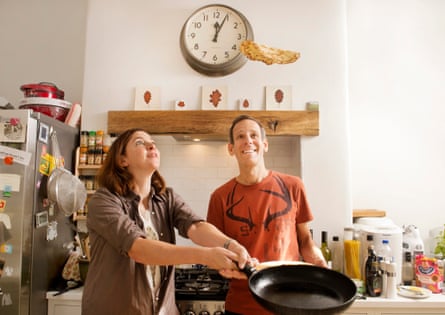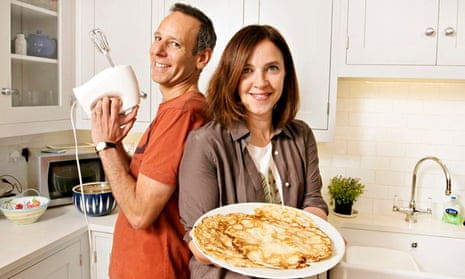It’s a terrible bind to be a foodie who hates to cook. For years I got away with it as my husband liked nothing better. Then we got divorced. At 40, when my marriage broke down, I was struck by the realisation that I was now a single parent on a low income, with two children of two and five – and I would have to cook for them. Not having made a meal since student days, my repertoire barely exceeded pasta with pesto.
Worse still was the height at which the bar had been set. My children, as tiny as they were, were gastronomically spoilt. My ex-husband, Simon, former food editor on the Jewish Chronicle, co-wrote a cookery book, Warm Bagels & Apple Strudel. Home had always been a testing ground for him, a place to experiment with bold and complex recipes. On the rare occasion the family meal fell to me, I would do fish fingers and beans, as there was simply no point trying to compete.
With the marriage finally over, I resigned myself to the fact that I would need to do better, and on a budget. My first attempt was soup. Cheap and easy – simmer onions and vegetables in a pan, add stock and water. How hard could it be? But like many so-called intuitive activities (riding a bike, learning to swim), they are only automatic if you have grown up doing these things. I wrestled with the rudiments – just how bubbly is a simmer? How much water is sufficient? When do you season? Will fish stock (which was all I had in the cupboard) suffice? The end result was terrible. It tasted watery, so I added tinned tomatoes. This made it too acidic, so I added honey. When this too failed, I stirred in a spoonful of Marmite. It was the dietary equivalent of sawing off table legs. The kids were in tears.
While I generally gloss over the miserable early months that followed the end of my marriage (a relationship that had lasted 13 years), when I bear to look back, I see myself standing in the kitchen, stirring my inedible broth, my youngest, Alex, waiting expectantly in his highchair, his face bright with hope and trust, and my daughter, Lucy, sitting spoon in hand. It is those few moments of blissful unawareness that choke me up. Soon I would serve them dinner and my new status as a single parent would be sealed by my inability to successfully feed and provide for my family.
If learning to sleep alone and manage our meagre finances wasn’t bad enough, this was worse. Plus the children were still hungry. I turned next to the bookshelf, only to discover that all the recipe books belonged to my ex. The only one left was The Student’s Cookbook by the aptly named Jenny Baker, printed in 1985, from which I’d only ever perfected welsh rarebit.
Quite why I’d never learned to cook, comes down to a lack of aptitude and interest. My parents are reasonable in the kitchen but I can’t recall formally learning from them. Certainly, I made fairy cakes with my mum, but the prevailing memory is of licking the bowl afterwards rather than picking up baking tips. In adulthood, my mother did once show me how to make chicken soup but I was overwhelmed by how complicated it seemed and recall nothing of the ingredients and necessary steps. So it’s not that my parents didn’t try, but rather that I have retained nothing.
I love to eat and appreciate good food, but tire quickly when trying to follow recipes and have never mastered the art of making meals on the fly. I envy people who enjoy cooking. It is clearly highly creative and should be relaxing and rewarding, but I’ve never experienced it in that way. It always feels fiddly and stressful, with too much emphasis on precision timing and the juggling of pans. No matter how hard I have tried, it remains a chore – no different from cleaning or doing the laundry.
It had not occurred to me that the Life begins … adage would apply to learning to cook, but that is what I had to do. Being able to feed oneself is a basic life requirement, so it’s hard to overestimate the shock of having to acknowledge a total lack of proficiency.
If it was a jolt to me, it must be all the more terrible for those who don’t know a carving knife from a colander. Last year, a survey, conducted by YouGov on behalf of BBC Good Food, reported that 10% of Britons can’t cook a thing. And, while dwindling, there is still that generation of men for whom home economics was a woman’s preserve. At least for them, there is some assistance. Age UK runs its Kitchen Kings scheme, a skills-based class and lunch club for older men.
For those who don’t qualify, there are private courses in basic cookery, but at the time of my undoing, I had neither cash nor time to attend and was forced to rely on trial and error.
These days, my offerings remain below par but over the years I have learned to griddle meat, steam fish and boil vegetables. I have also remarried. My husband, Joel, like me, was the spouse who didn’t cook. His ex-wife would lose whole days in the kitchen perfecting dishes, from Malaysian laksa to light, airy soufflés. She made bread from scratch, concocted Asian fusion dishes that she pureed into baby food and whisked up pancakes shaped like Disney characters. Much like me, Joel had no need to venture into the kitchen.
Of course, when we first met, I don’t think either of us appreciated our mutual lack of cooking prowess. We tended to eat out. Significantly, neither of us invited the other over for dinner. Our predicament only became apparent when we moved in together. These days we wing it – Joel can grill and blends the best cocktails. When we have friends over, it’s invariably in the summer when we can barbecue, and dinner is served only after several rounds of highly potent margaritas have been consumed, rendering everyone too drunk to taste the food properly.

But this doesn’t solve our day-to-day domestic situation. We are two non-cooks, sharing a life together, responsible for feeding not just ourselves but our four children (my son and daughter, and Joel’s two girls, who spend every summer with us, over from their native US). The kids complain bitterly about our cooking, not comprehending that we were always supposed to be the washer-uppers, the table-layers – never the chefs. “But we eat broccoli when Daddy makes it,” is a favourite gripe from my two.
When they whinge, I tell them to take lessons from their dad (or mum in the case of my step-children). My 10-year-old son has made a start, producing perfect made-to-measure omelettes. My stepdaughters are also happy to tinker in the kitchen, concocting recipes from Nutella and peanut butter (their peanut butter and banana fritters are first-class).
My 13-year-old daughter, while having an aptitude for music and art, shows no creative flair in the kitchen. Like me, she loves good food but has little interest in its production.
In flippant moments, I tell her: “Well, you’ll just have to find a partner who can cook for you.”
But it’s poor advice, because if the love goes cold, you still have to eat.
Recently, we’ve taken to ordering food boxes from companies that provide precise ingredients and instruction cards. It’s a new venture for us and while the recipes sometimes seem complicated, the kids have been asking for seconds.
Time has also afforded my ex-husband and me more cordiality. These days when the kids say, “Daddy does it better”, I call him to ask how it’s done. A flurry of texts fly back and forth as he coaches me through the process.
It brings to mind a particularly poignant moment in the book Heartburn, the late Nora Ephron’s fictionalised account of her break-up from investigative journalist Carl Bernstein. Towards the end of the story, the protagonist, cookery writer Rachel Samstat, teaches her estranged husband how to make her much-coveted recipe for vinaigrette. This, above all else, shows that she has moved on and is ready to begin life anew.
I can relate to this. This summer, during a family trip to Cornwall, I made my ex-husband’s prized spaghetti bolognese. The dish went down so well that a few days after returning to the US, my stepdaughters called to request the recipe for their mum. When I think about this too hard, it messes with my mind – my ex-husband’s recipe crossing the Atlantic to my current husband’s ex-wife. But mostly when I muse on this, I see it as a triumph, the ultimate proof that culinary life exists – even after the chef has left the marriage.

Comments (…)
Sign in or create your Guardian account to join the discussion